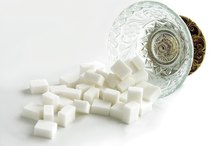What does fact checked mean?
At Healthfully, we strive to deliver objective content that is accurate and up-to-date. Our team periodically reviews articles in order to ensure content quality. The sources cited below consist of evidence from peer-reviewed journals, prominent medical organizations, academic associations, and government data.
The information contained on this site is for informational purposes only, and should not be used as a substitute for the advice of a professional health care provider. Please check with the appropriate physician regarding health questions and concerns. Although we strive to deliver accurate and up-to-date information, no guarantee to that effect is made.
Diet for Liver Hemangioma
A liver hemangioma is a tangled mass of poorly formed blood vessels that occurs in the liver. It is typically benign, and may not even be discovered unless a patient is undergoing a procedure or test for another condition. Most liver hemangiomas can be left alone, but if one should grow large enough to push on nearby organs in the abdomen and cause problems, treatment may be necessary.
Symptoms and Treatment
If you suspect that you have a liver hemangioma, look for symptoms that include:
- feeling full after eating only a small amount of food
- lack of appetite
- pain in the upper right portion of the abdomen
- nausea
- vomiting
If these symptoms persist, speak to your physician. He can order tests that will determine if you have a liver hemangioma, where it is located and how it may possibly be treated.
Diet
Can Liver Problems Cause Leg Pain?
Learn More
Because liver hemangiomas are thought to be caused by birth defects, and the likelihood of them occurring increased by pregnancy and menopausal hormone replacement therapy, there is no specific diet to follow to prevent or treat them. A healthy diet, however, will aid in keeping the liver in optimal shape. The liver is the largest organ in the body, and it is responsible for converting food into energy, clearing toxins from the blood and aiding in digestion. Maintain a balanced diet to keep the liver functioning as it should.
Ensure that you are getting adequate amounts of vitamins and minerals by consuming fruits and vegetables each day. A liver that has been burdened or damaged by a liver hemangioma may not be able to store enough vitamins and minerals, so include additional ones in your diet. Limit the amount of protein and sodium you consume. Protein is harder for the liver to process, and excess sodium can cause fluid build-up in the abdominal cavity. Maintain a diet that is low in fat and high in carbohydrates. Excess fat can burden the liver, but carbohydrates are needed to provide energy to the body. Drink alcohol only in moderation, as alcohol is toxic to the liver and to nerves, and forces the liver to work harder to eliminate it from the body.
Promote the health of your liver by adding specific foods to your daily diet. These include garlic and onions, which aid in effective detoxification; cruciferous vegetables, which also aid in detoxification and enzyme production; high-antioxidant fruits, artichokes and bitter leafy salad greens.
- Because liver hemangiomas are thought to be caused by birth defects, and the likelihood of them occurring increased by pregnancy and menopausal hormone replacement therapy, there is no specific diet to follow to prevent or treat them.
- Drink alcohol only in moderation, as alcohol is toxic to the liver and to nerves, and forces the liver to work harder to eliminate it from the body.
Related Articles
References
- MedlinePlus: Liver Diseases
- Cleveland Clinic. Cirrhosis of the Liver. Reviewed January 11, 2019.
- David S, Hamilton JP. Drug-induced Liver Injury. US Gastroenterol Hepatol Rev. 2010;6:73–80.
- American Liver Foundation. Medications.
- Cleveland Clinic Health Essentials. Is Acetaminophen Safe to Take When You're Drinking? Published December 19, 2017.
- University of Michigan, Michigan Medicine. Methyldopa. Revised September 17, 2018.
- Elsevier Science Direct. Hypervitaminosis A. Published 2015.
- National Center for Biotechnology Information, U.S. National Library of Medicine. LiverTox: Clinical and Research Information on Drug-Induced Liver Injury: Vitamin A. Updated December 3, 2013.
- National Center for Biotechnology Information, U.S. National Library of Medicine. LiverTox: Clinical and Research Information on Drug-Induced Liver Injury: Niacin. Updated February 2, 2014.
- Amathieu R, Levesque E, Merle JC, et al. Insuffisances hépatiques aiguës sévères d'origine toxique : prise en charge étiologique et symptomatique [Severe toxic acute liver failure: etiology and treatment]. Ann Fr Anesth Reanim. 2013;32(6):416–421. doi:10.1016/j.annfar.2013.03.004
- Devarbhavi H. An Update on Drug-induced Liver Injury. J Clin Exp Hepatol. 2012;2(3):247–259. doi:10.1016/j.jceh.2012.05.002
- Johns Hopkins Medicine. Drug-Induced Hepatitis.









